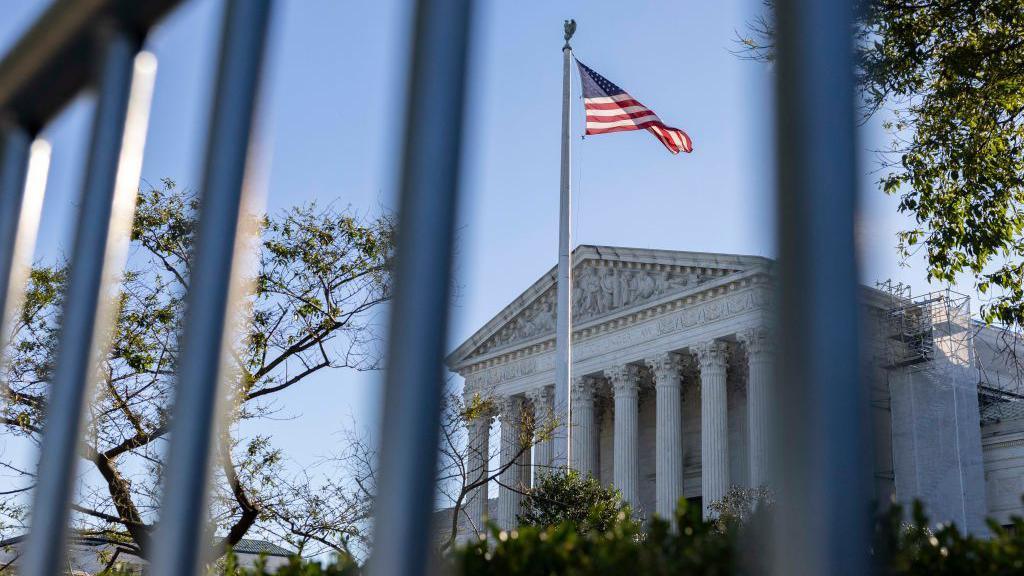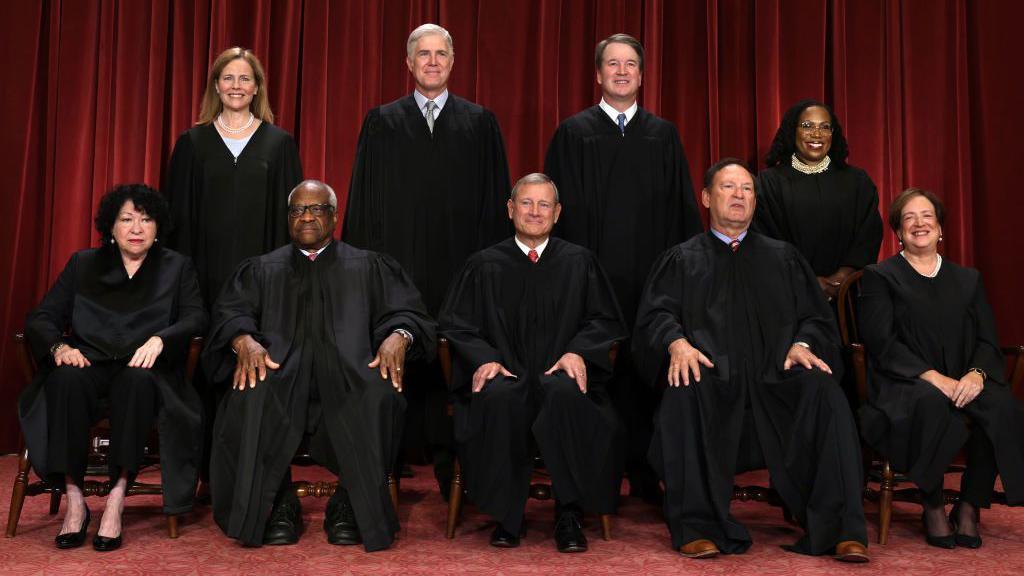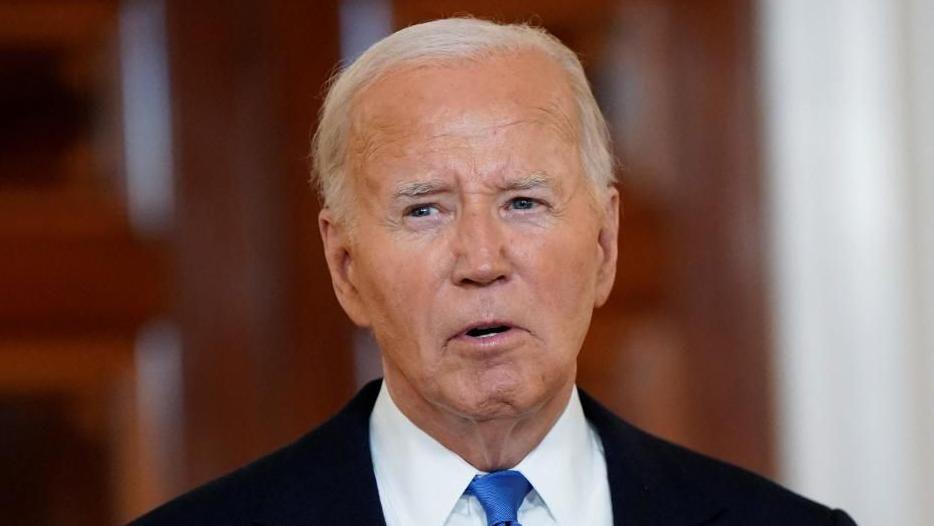Biden criticises 'extreme' Supreme Court in push for reform

The court's six conservative members form a sizeable majority in the nine-member Supreme Court
- Published
Joe Biden has criticised the "extreme opinions" of the Supreme court as he proposed sweeping reforms including the removal of life appointments.
The proposals come after the current conservative-dominated court issued a series of major decisions, including upending the constitutional right to abortion and allowing presidents wide-ranging immunity from prosecution for "official acts".
Mr Biden has proposed an 18-year term for justices and an enforcable ethics code "to restore trust and accountability".
He however faces a difficult task to gain Congressional approval given Republican control of the House of Representatives.
Democrats hope that pushing for reform can help galvanise voters before November's election.
At the same time, it has been dogged by allegations of judicial ethics violations, particularly after journalists investigated Justice Clarence Thomas for not reporting gift.
The court's nine justices serve for life under current rules, and new appointments are made by the sitting president when a member retires or dies. Donald Trump appointed three justices in his four years in office.
Biden slams 'extreme opinions'
In a speech on Monday in Austin, Texas, Mr Biden said that the "extreme opinions" handed down by the court "have undermined law and established civil rights principles and protections".
The president added that the court was "mired in a crisis of ethics", citing conflicts of interests among justices.
"I'm certain we need these reforms to restore trust in the court, preserve the system of checks and balances that are vital to our democracy," he said.
The speech marked the 60th anniversary of the Civil Rights Act.
In an article published earlier in the day in the Washington Post, Mr Biden said that "what is happening now is not normal".
"It undermines the public's confidence in the court's decisions, including those impacting personal freedoms," he wrote, external. "We now stand in a breach."
Mr Biden has proposed a new justice is appointed to the court every two years, who would then serve for 18 years. Reform advocates have previously suggested that such a staggered system would help depoliticise the court.
The president also want Congress to establish a new code of ethics that would force justices to disclose gifts and avoid overt political activities.
While the court released a code of ethics for the first time in its history last year, the it has no enforcement mechanism.
Lastly, Mr Biden hopes to pass an amendment to the US constitution that would reverse a 1 July ruling in which the Supreme Court said that Donald Trump and other former presidents are immune from criminal prosecution.
In the controversial ruling, the court's justices found that a president has immunity for "official acts" but is not immune from "unofficial acts".
In his article, Mr Biden said that the proposed amendment - which he has dubbed "No One is Above the Law" - would "make clear that there is no immunity for crimes a former president committed while in office".
"I share our founders' belief that the president's power is limited, not absolute," he wrote. "We are a nation of laws - not of kings or dictators".
Reforms 'DOA' says top Republican
Republicans have pushed back on efforts to reform the court.
In a Monday statement, the Trump campaign accused President Biden and vice president - and presumptive Democratic nominee - Kamala Harris of working to "undermine the legitimacy" of the court.
"It's all part of Kamala's scheme to pack the Supreme Court with far-left, radical judges who will render decisions based on politics, now the law," the Trump statement said.
On Sunday, South Carolina Senator Lindsey Graham told CBS, the BBC's US partner, that Democrats made no effort to do so when a more liberal-leaning group of justices were "pumping out opinions they liked."
Earlier this month, Trump also described efforts to reform the court as an "illegal" and "unconstitutional" attack on the "sacred" institution.
"The Democrats are attempting to interfere in our presidential election, and destroy our justice system, by attacking their political opponent, me, and our honourable supreme court," he wrote.
"We have to fight for our fair and independent courts, and protect our country."
Republican House Speaker Mike Johnson called the proposal "dead on arrival" in the House. In reply, Mr Biden said Mr Johnson's "thinking is dead on arrival".
Senate Republicans also denounced Mr Biden's proposals, with Ted Cruz of Texas saying they were "an assault on the legitimacy of the court".
Josh Hawley, of Missouri, said they were a "wholesale attack on the court" which would "gut the institution".
Elizabeth Warren, a Democratic senator from Massachusetts, said that the reform plan put the future of the Supreme Court "on the ballot" in the November presidential election.
Professor Daniel Urman, who teaches law and public policy at Northeastern University in Boston, described the proposal as "too little, too late".
"Rarely do lame duck presidents secure major legislative victories, and, even if so, Republicans, who are happy with the current Supreme Court, control the House," Prof Urman told the BBC.
"The interesting question is what [Vice President] Harris will do on this issue during the campaign," he added. "Court reform is pretty popular, especially term limits."
Related topics
- Published2 July 2024

- Published1 July 2024

- Published2 July 2024
